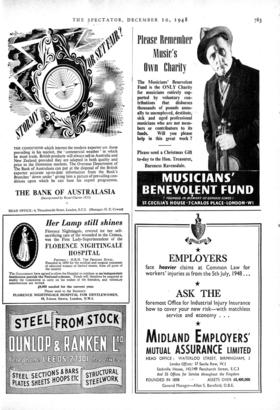Two Views of S - cotland IT is a good idea to
read these two books together. For one thing, the eight-mile-to-the-inch map tucked in the end of Mr. Fraser's book will elucidate Mr. McLaren's wanderings as well as his own, and his x68 photographs illustrate nearly all the places mentioned in Stern and Wild. The two share out Scotland nicely between them, Mr. McLaren being strong on the Highlands and Islands, which Mr. Fraser knows as a sympathetic Lowland visitor, Mr. Fraser excelling on the landscape and life of the north-east—Buchan, Aberdeen, and the fishing towns and villages—to which Mr. McLaren makes but chilly reference. Mr. McLaren, nursing the happiest memories of sunny childhood walks, of fantastic fancy-dress dances, of tremendous fire-lit sessions while rain lashed the windows, frankly adores Edinburgh, though his nerves are regularly shattered by the one o'clock gun ; Mr. Fraser, though the gun thrills him like Nortinbras' " Go, bid the soldiers shoot ! ", finds his attitude to Edinburgh well expressed in Marjorie Fleming's phrase, " A Con- spicuous Town."
In approach and temperament also the writers complement each other. Mr. McLaren is volatile, amusing and rather slapdash ' • with a gift for spotting the unexpected, illuminating detail, for unearthing the curious piece of history or folk-lore. He has a fascinating story of Victorian saturnalia at a pub in Rose Street, where the young rips of the town met the charming servant-girls of Moray Place and Heriot Row, summoned thither by a mysterious piper. Mr. Fraser is more conscientious and thorough, with a firmer grasp of fact and history, a far wider range of quotation, and a keener wish to be fair. His remarks, for instance, on Leverhulme's projects for Lewis are both sensible and just. Both writers discuss the topical question of Lallans, the writing of poems in Scots—Mr. McLaren with an eye for the comic sidelight and a diverting account of an Edinburgh poetry-reading, Mr. Fraser with a poet's serious interest in the right use of words.
Yet, however convenient such comparison may be for the reviewer, neither author wrote his book in order to be weighed and measured against the other. Indeed, the aims of the two books are widely different. Stern and Wild is written round a supposed journey through Scotland made by the author and a friend from the South. In fact, it is a series of monologues by Mr. McLaren (with " Paul " simply providing the cues) interspersed with skilful and amusing sketches of Scottish life and scenery, ranging from an outing down the Clyde to a night's fishing in the West Highlands. Mr. McLaren holds forth on Glasgow tramcars and Glasgow intellectuals, Highland clearances and Highland scenery (but did Leighton paint glens and stags?), on the hopes of the Scottish Renaissance ; he gives the feel of Scotland today, the topics that are being discussed by students and writers, journalists and patriots.
Mr. Fraser's was a more precise assignment—to supply a text to complement a splendid series of photographs, and some charming drawings by Barbara Jones. (Her " Salutation Hotel, Perth," " Shell Garden, Leven," and " David Glen's Bagpipe Shop " are especially
attractive.) Mr. Fraser has six excellent chapters on the various regions of Scotland ; there is no attempt at guide-book comprehen- siveness, but vividly realised detail, and a poet's knack of imaginative phrasing—" the elegance and the sadness of St. Andrew's "—bring a scene to life. He casts a knowledgeable eye on the architecture of a district, he has Scottish history firmly rooted in his mind and not, as with so many topographical writers, merely at the tip of his fountain-pen. But it is in conveying the quality of everyday life that he is most successful—whether the ugliness and vitality of the Glasgow slums, or the earthy, hearty life of the Borders, with their Ridings, and fox-hunting and faintly feudal flavour.
In his long introduction Mr. Fraser formulates his views on Scotland in general—a process which seems almost imperative for every articulate, inrsospective Scot. He writes with deep affection, but also with d'etieithent ; his own country was never so keenly in his mind, he tells us, as when he was in the Middle East. Sunday afternoon in an Eritrean village brought many Scottish Sunday walks to mind ; in the spare beauty of the Palestine landscape and the laborious earnestness of the Jewish pioneers he found many like- nesses to home. Questions such as the revival of national feeling, self-government for Scotland, the virtues and limitations of provin- ciality, do not have the same emotional urgency for him as for Mr. McLaren ; he approathes them more weightily, and with a greater range of comparison with other countries. But on all of them he has something sensible and penetrating to say. "The pleasantest things in Scotland are rather archaic " ; " The humanist notion of the balanced and harmonious personality has, in fact, never had sufficient sway in Scotland." He has, indeed, provided an excellent, imagin- ative guide, not only -to Scotland's landscapes and cities, but to her














































 Previous page
Previous page